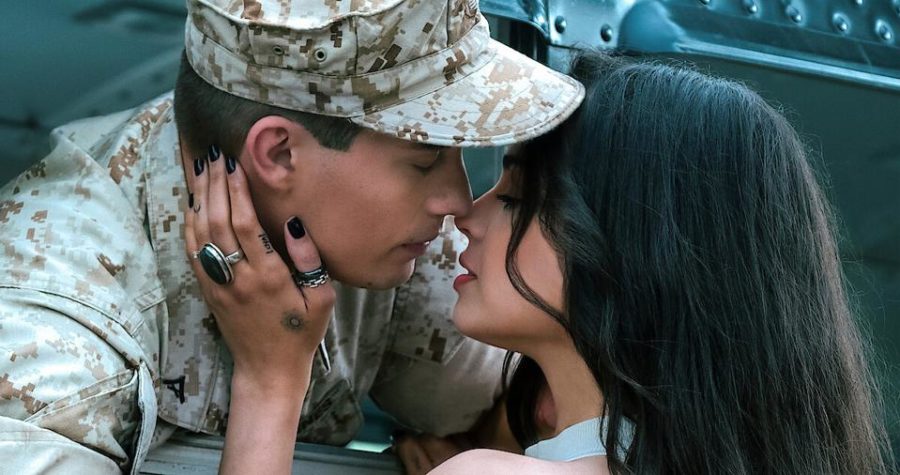‘Purple Hearts’ is popular but problematic
“Purple Hearts” characters, Cassie and Luke, say goodbye to each other before Luke is shipped out with the marines. The two characters are in a fake marriage to amass financial benefits.
August 29, 2022
Filled with intense pining, heated looks, and witty banter, enemies to lovers is one of the most popular trends today in all forms of storytelling. While it’s a trope we have all grown to love, it’s quite easy to do wrong.
“Purple Hearts” was released late July in 2022, and has since become one of Netflix’s most successful films this year, racking up 220.6 million hours within the first 28 days. It also recently entered Netflix’s top 10 most popular films of all time. The film, also an adaptation of a Tess Wakefield novel, saw major success throughout the world, and many fans have stated they’ve seen it multiple times and still enjoy the film every viewing.
We follow Cassie Salazar (Sofia Carson) and Luke Morrow (Nicholas Galitzine) who enter a fake marriage for the financial benefits the military offers to married couples. Cassie, a struggling musician, needs the money to afford the insulin needed for her Type 1 diabetes, and Luke, a marine, needs to pay off debts to his old drug provider. The movie is pitched as not only including the popular enemies to lovers trope, but also forced proximity, and fake marriage.
Sofia Carson, executive producer and actress for Cassie, said the main goal of “Purple Hearts” was to show two people overcoming their political differences through love. Yet the film doesn’t actually show two people working through their disagreements.
The main conflict throughout the film revolves around Cassie and Luke’s political differences. For the first half of “Purple Hearts,” we see Cassie and Luke fighting about their respective political beliefs including racist remarks, gun control, illegal immigrants, and other controversial topics in nearly every scene. However, throughout them falling in love with one another, we never see them compromising or unlearning the beliefs they were taught throughout their lives.
One popular scene includes another marine saying blatantly racist remarks in a toast at a going away party, and Cassie calling him out. Luke “orders” her to sit down, and they eventually make up by hugging outside to avoid suspicion from their friends. They never actually work through the issue of racism. We only ever see Cassie turning her back on every belief she had related to the military and gun violence. Luke is never shown overcoming his issues, nor apologizing for them.
The problem with this film doesn’t lie with a progressive person falling in love with a conservative one, but rather their complete lack of communication throughout it. The attempted message of overcoming differences was well intended, but all this film managed to accomplish was teaching young women to abandon their views for a significant other.






